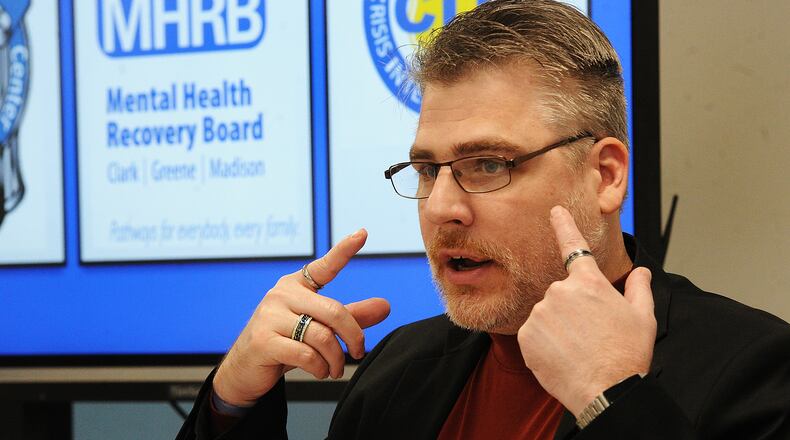“What people often don’t realize is that when someone is experiencing a crisis, it’s not always going to be obvious,” said Curtin, who was diagnosed with bipolar disorder in 2001. “I will act and behave in a way that feels rational to me, but an outside observer might consider my behavior threatening.”
Most of his encounters with officers happened while he was experiencing a mental health crisis.
“So the experiences I’ve had with law enforcement that have had the best outcomes are those when the officer recognized that I was in crisis and was able to gain my trust and calm me down,” he said.
The Crisis Intervention Team training event was offered by the Mental Health Recovery Board of Clark, Greene & Madison Counties in partnership with the Greene County Criminal Justice Academy. Employees from the Greene and Clark counties sheriff’s offices took the training, as did Greene County Adult Probation Department staff and 28 police recruits enrolled now in the Greene County Criminal Justice Academy.
CIT helps officers by partnering law enforcement with mental health and substance abuse experts, those living with mental illness and/or substance use disorders, and their families.
Greta Mayer, CEO of the Mental Health Recovery Board, said officers are first responders to a variety of crises.
“They are first on the scene and have to ascertain very quickly whether someone is a danger to themselves or others under pressure,” Mayer said. “When someone is in the middle of a mental health crisis, they may be out of touch with reality and unable to respond to police commands, which could lead to tragedy.”
The curriculum covered topics such as the brain, severe mental illness, diversity, and emergency hospitalization. Panel discussions include individuals who have lived experiences and professionals from behavioral health providers in the area.
Mayer said the training helps “our law enforcement officers recognize when a call they’re responding to involves someone experiencing a mental health crisis and show how they can de-escalate the situation to keep everyone safe.”
As more officers undergo the training, Mayer said community support grows and the relationship with mental health experts deepens.
“Law enforcement officers make life-and-death decisions every day,” she said. “It’s a heavy burden to bear – but we are here every step of the way to help support them in their important work and in their personal lives when they need it.”
That includes helping officers protect their own mental health on the job.
“MHRB is here to help provide discreet pathways to care,” Mayer said.
Curtin also noted the program is designed to reduce pressure officers might feel in the current social climate.
“Everyone has a camera phone now and there’s more attention being placed on police behavior, which makes everyone defensive. But think about it this way – CIT means safety for everyone, community members and police officers alike,” he said.
Curtin now is on the board for the National Alliance on Mental Illness of Clark, Greene and Madison Counties.
Mental illness affects one in five people in America, he said.
“That means that everyone, even a police officer, has a parent or sibling or friend with mental illness, or they might be dealing with it themselves,” Curtin said. “What you learn at CIT is how to protect not just your community, but yourself too.”
HOW TO GET HELP
The Mental Health Recovery Board offered the following tips:
If you or someone you know is experiencing a mental health crisis, help is available.
Contact crisis counselors anytime 24/7 through calling the National Suicide & Crisis Lifeline by dialing 9-8-8 or Crisis Text Line by texting ‘4HOPE’ to 741741.
In a medical emergency, always dial 911.
For more information about mental health and substance use resources in Clark, Greene and Madison counties, visit the MHRB website at www.mhrb.org.

